Southtalks Archive
Presented by Jennifer Conner, Brookshield Laurent, Anne Cafer, and Meagen Rosenthal In this SouthTalk, University of Mississippi professors and co-directors of the UM Community First Research Center for Wellbeing and Creative Achievement, Anne Cafer and Meagen Rosenthal, moderate a Q&A Sept. 9 at noon with Jennifer Conner and Brookshield Laurent of the Delta Population Health Institute. Their discussion expands upon the work of the Delta Population Health Institute shared in the prerecorded talk. During the prerecorded talk, Conner and Laurent present on how their training has taught them how to listen to the stories of our bodies, which inform their work in population health in the Delta. Conner and Laurent explore how the interconnectedness of place, time, and health are expressed in our bodies and can serve as the pathway for holistic healing for self and communities. Jennifer Conner was instrumental in launching the Arkansas Coalition for Obesity Prevention and has achieved many policy, system, and environment changes along the southern US region to improve community resiliency. In 2019 Conner was named a Robert Wood Johnson Foundation Culture of Health Leader finalist and led her hometown of Lake Village, Arkansas, in being named a RWJF Culture of Health Community Prize finalist. Brookshield Laurent is the founding chairwoman for the department of Clinical Medicine at NYIT-COM at Arkansas State University and the founding executive director for the Delta Population Health Institute. Anne Cafer is an assistant professor of sociology, and her research focuses on improving community-level resilience by integrating food and healthcare systems for better. Meagen Rosenthal is an associate professor of pharmacy administration, and her research focuses on developing systems to integrate health research evidence into practice faster and more effectively. SouthTalks is a series of events (including lectures, performances, film screenings, and panel discussions) that explores the interdisciplinary nature of Southern Studies. As a result of the current health crisis, all events will be virtual, free, and accessible on the Center’s YouTube channel. Visit the Center’s website for up-to-date information about all Center events. Registration will be required for all events. Diane Williams, author of The Life and Legacy of B.B. King: A Mississippi Blues Icon The Thacker Mountain Radio Hour is a weekly live radio show featuring author readings and a wide array of musical performances. The show under normal circumstances is live from the square in Oxford, Mississippi and recorded and broadcast weekly. Due to Covid19, the broadcast will air on Saturday evenings this fall and can be heard on Mississippi Public Broadcasting at 7 p.m. and on Alabama Public Radio at 9 p.m. and rebroadcast on local WUMS the following Thursdays at 6 pm. Listeners who miss the live radio broadcasts can listen back to the show from Thacker Mountain’s archives available on their website www.thackermountain.com. Host, Jim Dees will be in conversation with author and storyteller, Diane Williams. Williams calls herself a “narratologist.” She is a professional performing artist/storyteller, teaching artist, author, poet and mixed-media fiber artist whose tapestries often tell stories. She is a retired director of grants for the Mississippi Arts Commission and currently serves on the Mississippi Humanities Council’s Speakers Bureau. In this intimate portrait of B.B. King, author Diane Williams offers a brief account of the monumental blues man’s life before settling in for a series of interviews with his bandmates and beloved family members, offering readers an invaluable opportunity to feel like they know King too. In addition to this conversation, listeners will enjoy the sounds of the radio show’s house band, the Yalobushwackers and guest musicians—Memphis-born, Mississippi-based spiritual blues scion Rev. John Wilkins and Australian guitarist, vocalist, and founding member of the Australian blues group, Backsliders, Dom Turner. This is event is a partnership between Thacker Mountain Radio Show and the Center for the Study of Southern Culture in celebration of Living Blues magazine’s 50th Anniversary. *No registration needed to tune into this radio show. “Why Dystopia Now? Exploring the Place, Value, and Necessity of Speculative and Dystopian Themes in Maurice Carlos Ruffin’s We Cast a Shadow” Presented by Maurice Ruffin and Hilary Word In this SouthTalk, Southern Studies MA graduate Hilary Word and 2020–21 University of Mississippi Grisham Writer in Residence, Maurice Carlos Ruffin, sit down to discuss Ruffin’s latest work, the dystopian-satire novel We Cast a Shadow. Word and Ruffin expand upon their prerecorded conversation on Ruffin’s book in this live Q&A. The prerecorded conversation is below. Maurice Carlos Ruffin’s novel We Cast a Shadow was a finalist for the PEN/Faulkner Award and was longlisted for the PEN America Open Book Prize, the Center for Fiction Prize, and the Aspen Words Literary Prize. A New Orleans native, Ruffin is a professor of creative writing at Louisiana State University. His forthcoming book of short stories, The Ones Who Don’t Say They Love You, will be published in 2021. SouthTalks is a series of events (including lectures, performances, film screenings, and panel discussions) that explores the interdisciplinary nature of Southern Studies. As a result of the current health crisis, all events will be virtual, free, and accessible on the Center’s YouTube channel. Visit the Center’s website for up-to-date information about all Center events. Registration will be required for all events. James G. Thomas, Jr. and Jessica Wilkerson present “The Lebanese in Mississippi: An Oral History” as part of the Movement and Migration Series. The Zoom link is https://olemiss.zoom.us/j/94844636260. James G. Thomas, Jr.’s recent work “The Lebanese in Mississippi: An Oral History” documents and interprets the lives of first- and subsequent-generation Lebanese Mississippians whose families immigrated to the state looking for a better life. It is an oral record of their forbears’ experiences of settling in a foreign land where they knew few people, did not speak the language, and had to create their own occupations. Ultimately, however, it is the collective story of maintaining an ethnic identity while assimilating into a new culture. Thomas’s work provides a picture of a people remembering, envisioning, and interpreting where they came from and the struggles of those who came before them. In this live Q&A, Thomas and Wilkerson discuss the origins and findings of Thomas’s study. The project can be found online at www.thelebaneseinmississippi.com. Originally from the Mississippi Delta, James G. Thomas, Jr. is the associate director for publications at the Center for the Study of Southern Culture. He holds a BA in English and philosophy, an MA in Southern Studies, and an MFA in documentary expression, each from the University of Mississippi. Jessica Wilkerson is associate professor of history at West Virginia University, where she holds the Stuart and Joyce Robbins Chair, a position she began in fall of 2020 after spending six years at the University of Mississippi. She is the author of To Live Here, You Have to Fight: How Women Led Appalachian Movements for Social Justice. SouthTalks is a series of events (including lectures, performances, film screenings, and panel discussions) that explores the interdisciplinary nature of Southern Studies. As a result of the current health crisis, all events will be virtual, free, and accessible on the Center’s YouTube channel. Visit the Center’s website for up-to-date information about all Center events. Registration will be required for all events. The Movement and Migration Series Lectures in the spring of 2020 featured programming around the theme “Movement and Migration in, to, and through the US South” as a way of thinking about urgent issues connected to borders and belonging. Simone Delerme and Annemarie Anderson present “From Latino Orlando to International Memphis: Migration and Transformation in the US South” as part of the Movement and Migration Series. In this live Q&A at noon, Sept. 30, Annemarie Anderson, Southern Foodways Alliance oral historian, and Simone Delerme discuss Delerme’s recently published book, Latino Orlando: Suburban Transformation and Racial Conflict, and her current work in Memphis. A live Q&A with viewers follows the conversation, available to watch here https://olemiss.zoom.us/j/96942683247 Simone Delerme joined the University of Mississippi’s Department of Sociology and Anthropology and the Center for the Study of Southern Culture in the fall of 2013. She specializes in migration to the U.S. South, with interests in race relations, integration and incorporation, community development, and social class inequalities. Annemarie Anderson conducts oral history work throughout the South. SouthTalks is a series of events (including lectures, performances, film screenings, and panel discussions) that explores the interdisciplinary nature of Southern Studies. As a result of the current health crisis, all events will be virtual, free, and accessible on the Center’s YouTube channel. Visit the Center’s website for up-to-date information about all Center events. Registration will be required for all events. The Movement and Migration Series Lectures in the spring of 2020 featured programming around the theme “Movement and Migration in, to, and through the U.S. South” as a way of thinking about urgent issues connected to borders and belonging. Adrienne Domnick and Amanda Malloy present Art and Community Activism: Discussing Jackson’s Public Arts Programs, available to watch via Zoom here https://olemiss.zoom.us/j/91633048673. Southern Studies alumna Amanda Malloy and Jackson based artist and curator Adrienne Domnick will discuss Jackson, Mississippi’s public arts programs as a directive for community activism at noon Oct. 7. In talking about how her own work serves to inspire and uplift the Jackson community, Domnick will focus on the large-scale public pieces she has created in coordination with the Fertile Ground Project, which seeks to bring awareness to food insecurity in Jackson. Adrienne Domnick, a visual artist from Mississippi whose work is an exploration of sound, light, and bold colors through paint on a variety of surfaces. Her approach—redefining blank spaces by manipulating color and light to emphasize a particular expression, image, or emotion. She aims to rediscover black culture through the lens of contemporary art. Amanda Malloy received her M.A. from the University of Mississippi in Southern Studies, focusing on southern photography. During this time she completed an assistantship with The University of Mississippi Museum. She is currently the Visual Arts Editor of Mississippi Folklife. SouthTalks is a series of events (including lectures, performances, film screenings, and panel discussions) that explores the interdisciplinary nature of Southern Studies. As a result of the current health crisis, all events will be virtual, free, and accessible on the Center’s YouTube channel. Visit the Center’s website for up-to-date information about all Center events. Registration will be required for all events. Carol Anderson is the Charles Howard Candler Professor and Chair of African American Studies at Emory University, and her lecture will be available to watch via Zoom at https://olemiss.zoom.us/j/99815767328. Also on Oct. 13, Anderson will lead a “Black in the Academy” virtual discussion at 4 p.m. for graduate students, (click here for registration form) facilitated by Shennette Garrett-Scott, UM associate professor of history and African American studies. Anderson’s contributions to the ongoing Twitter conversation “Black in the Ivory,” created by Sharde Davis, amplify the voices of “Blackademics” to speak truth about racism in academia. Her lecture is “One Person, No Vote: How Voter Suppression is Destroying Our Democracy.” She is the author of Eyes Off the Prize: The United Nations and the African-American Struggle for Human Rights, 1944-1955, which was published by Cambridge University Press and awarded both the Gustavus Myers and Myrna Bernath Book Awards; as well as, Bourgeois Radicals: The NAACP and the Struggle for Colonial Liberation, 1941-1960, which was also published by Cambridge. Her third book, White Rage: The Unspoken Truth of our Racial Divide, won the 2016 National Book Critics Circle Award for Criticism and is also a New York Times Bestseller and a New York Times Editor’s Pick, and listed on the Zora List of 100 Best Books by Black Woman Authors since 1850. Her young adult adaptation of White Rage, We are Not Yet Equal was nominated for an NAACP Image Award. In addition to numerous teaching awards, her research has garnered fellowships from the American Council of Learned Societies, the Ford Foundation, National Humanities Center, Harvard University’s Charles Warren Center, and the John Simon Guggenheim Foundation. She is a regular contributor to The Guardian and advisor for it yearlong series on voting rights. Organized through the Center for the Study of Southern Culture, the African American Studies Program, Center for Civil War Research, and the Arch Dalrymple III Department of History, the Gilder-Jordan Speaker Series is made possible through the generosity of the Gilder Foundation, Inc. The series honors the late Richard Gilder of New York and his family, as well as UM alumni Dan and Lou Jordan of Virginia. As a result of the current health crisis, all events will be virtual, free, and accessible on the Center’s YouTube channel. Visit the Center’s website for up-to-date information about all Center events. Registration will be required for all events. Jim Downs, Carol Anderson, and Kevin M. Kruse present a roundtable discussion on “Voter Suppression and U.S. Elections” at 6 p.m. Wednesday, Oct. 14 as part of the Voting Rights and Community Activism series. This discussion will be available via Zoom at https://olemiss.zoom.us/j/97772145536. In this election year, the Center for the Study of Southern Culture has partnered with the University of Georgia Press to host a roundtable discussion with coeditor of the UGA Press History in the Headlines series and editor of the recently published Voter Suppression in US Elections, Jim Downs. Carol Anderson and Kevin M. Kruse join Downs in this conversation. Jim Downs is the Gilder Lehrman NEH Professor of History and Civil War Studies at Gettysburg College. He is the author or editor of six other books, including Sick from Freedom: African American Illness and Suffering during the Civil War and Reconstruction. Carol Anderson is the Charles Howard Candler Professor and Chair of African American Studies at Emory University. She is the author of Eyes off the Prize: The United Nations and the African American Struggle for Human Rights, 1944–1955, Bourgeois Radicals: The NAACP and the Struggle for Colonial Liberation, 1941–1960, White Rage: The Unspoken Truth of Our Racial Divide, and One Person, No Vote: How Voter Suppression Is Destroying Our Democracy. She is a regular contributor to the Guardian and advisor for its yearlong series on voting rights. Kevin M. Kruse studies the political, social, and urban/suburban history of twentieth-century America. Focused on conflicts over race, rights, and religion, he has particular interests in segregation and the civil rights movement, the rise of religious nationalism and the making of modern conservatism. He is the author of White Flight: Atlanta and the Making of Modern Conservatism, One Nation under God: How Corporate America Invented Christian America, and, with Julian Zelizer, Fault Lines: A History of the United States since 1974. SouthTalks is a series of events (including lectures, performances, film screenings, and panel discussions) that explores the interdisciplinary nature of Southern Studies. As a result of the current health crisis, all events will be virtual, free, and accessible on the Center’s YouTube channel. Visit the Center’s website for up-to-date information about all Center events. Registration will be required for all events. Journalist and educator W. Jelani Cobb writes about the enormous complexity of race in America. As recipient of the Sidney Hillman Prize for Opinion & Analysis Journalism for his New Yorker columns, Cobb was praised for combining “the strengths of an on-the-scene reporter, a public intellectual, a teacher, a vivid writer, a subtle moralist, and an accomplished professional historian”—qualities he brings to his gripping talks. Jelani Cobb joined Columbia University’s Journalism School faculty in 2016. He has contributed to The New Yorker since 2012, and became a staff writer in 2015. Before coming to Columbia, Cobb was an Associate Professor of History and Director of the Africana Studies Institute at the University of Connecticut where he specialized in post-Civil War African American history, 20th century American politics and the history of the Cold War. Dr. Cobb is also a recipient of fellowships from the Fulbright and Ford Foundations. Dr. Cobb is the author of The Substance of Hope: Barack Obama and the Paradox of Progress as well as To the Break of Dawn: A Freestyle on the Hip Hop Aesthetic. His articles and essays have appeared in The Washington Post, The New Republic, Essence, Vibe, The Progressive, and TheRoot.com. His collection The Devil and Dave Chappelle and Other Essays was published in 2007, and he is the editor of The Essential Harold Cruse: A Reader, published in 2002. Born and raised in Queens, New York. He is a graduate of Howard University and Rutgers University where he received his doctorate in American History. This event is sponsored by the Center for the Study of Southern Culture as part of the Future of the South Initiative and the Voting and Community Activism events this fall. Other sponsors include the Division for Diversity and Community Engagement, the College of Liberal Arts, the Sally McDonnell Barksdale Honors College, the School of Law, the Arch Dalrymple III Department of History, the Department of English, the Sociology and Anthropology Department, Department of Political Science and the School of Journalism and New Media. SouthTalks is a series of events (including lectures, performances, film screenings, and panel discussions) that explores the interdisciplinary nature of Southern Studies. As a result of the current health crisis, all events will be virtual, free, and accessible on the Center’s YouTube channel. Visit the Center’s website for up-to-date information about all Center events. Registration will be required for all events. “You Asked for the Facts: Bobby Kennedy at the University of Mississippi” Documentary Film discussion and Q&A with Mary Blessey and W. Ralph Eubanks This event is a partnership with the Oxford Film Festival. Screen the film and join the Q&A here: https://watch.eventive.org/oxfordac/play/5f60f719ed263d0098d405b7. The film is free to the first 100 participants. It will change to a pay what you can model after receiving 100 viewers. In 1966, four years after the historic enrollment of James Meredith at the University of Mississippi, students devised a plan to get around Mississippi’s “Speaker Ban” and bring Robert F. Kennedy to the university to reveal the truth about phone calls with former governor Ross Barnett. Ralph Eubanks will discuss the film with director and alumna of the University of Mississippi, Mary Blessey. Mary Blessey is an independent documentary filmmaker based in her hometown of Biloxi, Mississippi. She attended Millsaps College in Jackson, Mississippi and earned her M.A. in Southern Studies and an M.F.A. in Documentary Expression from the Center for the Study of Southern Culture at the University of Mississippi in Oxford, Mississippi. She recently produced and directed the historical documentary film “You Asked For the Facts: Bobby Kennedy at the University of Mississippi,” which premiered its first advance screening at the Mississippi Civil Rights Museum in December 2019 and has been chosen as an official selection at the March on Washington Film Festival, the Montclair Film Festival, The San Diego International Film Festival, and several others. “You Asked For the Facts” is Blessey’s first feature-length documentary. Ralph Eubanks is a visiting professor of Southern Studies, English, and the Sally McDonnell Barksdale Honors College. Eubanks is author of The House at the End of the Road: The Story of Three Generations of an Interracial Family in the American South and Ever Is A Long Time: A Journey into Mississippi’s Dark Past, which Washington Postbook critic Jonathan Yardley named as one of the best nonfiction books of the year. He has contributed articles to the Washington Post’s Outlook and Style sections, the Wall Street Journal, WIRED, The New Yorker, and National Public Radio. He is a recipient of a 2007 Guggenheim Fellowship from the John Simon Guggenheim Foundation and has been a fellow at the New America Foundation. He is the former editor of the Virginia Quarterly Review at the University of Virginia and served as director of publishing at the Library of Congress in Washington, D.C., from 1995 to 2013. Adam Gussow, Ken “Sugar Brown” Kawashima, and B. Brian Foster present “Whose Blues? Black Bluesism, Blues Universalism, and the Postmodern Paradoxes of America’s Global Music” at 3 p.m. Thursday, Oct. 29. In this live Q&A, Adam Gussow and Ken “Sugar Brown” Kawashima, a Korean-Japanese American bluesman highlighted in Gussow’s book Whose Blues? Facing Up to Race and the Future of the Music, will be joined by Brian Foster, assistant professor of sociology and Southern Studies, for a conversation on Gussow’s book. A prerecorded talk between Gussow, Kawashima, and Foster is available below, and Foster will begin the live Q&A with prepared questions, then open it up to viewers. Adam Gussow is a professor of English and Southern Studies at the University of Mississippi and a professional blues harmonica player. He is the author of five books on the blues, including Mister Satan’s Apprentice and Beyond the Crossroads: The Devil and the Blues Tradition. Satan and Adam, a documentary about his decades-long partnership with guitarist Sterling “Mr. Satan” Magee, is currently screening on Netflix. Ken Kawashima is a professor of modern Japanese history and Marxist theory in the Department of East Asian Studies at the University of Toronto. He is author of The Proletarian Gamble: Korean Workers in Interwar Japan, co-editor of Tosaka Jun: A Critical Reader, and the English translator of Uno Kozo’s Theory of Crisis. He is also a blues musician, singer, and composer known as Sugar Brown. He has released three albums of original blues music: Sugar Brown’s Sad Day, Poor Lazarus, and It’s a Blues World . . . Calling All Blues. Brian Foster is an assistant professor of sociology and Southern Studies at the University of Mississippi. His work has appeared in the Washington Post, the Bitter Southerner, and Oxford Magazine. His first book, I Don’t Like the Blues: Race, Place, and the Backbeat of Black Life, which focuses on race and community life in the Mississippi Delta, will be out December 2020. SouthTalks is a series of events (including lectures, performances, film screenings, and panel discussions) that explores the interdisciplinary nature of Southern Studies. As a result of the current health crisis, all events will be virtual, free, and accessible on the Center’s YouTube channel. Visit the Center’s website for up-to-date information about all Center events. Registration will be required for all events. Ralph Eubanks and David Wharton present “Looking at Southern Landscapes: Inspiration, Influence, and Impact” at noon Wednesday, Nov. 11. David Wharton has an M.F.A .in photography and a PhD in American studies, both from the University of Texas at Austin. He is the author of three books of photographs, with a fourth due to be published in 2021. He has taught at the University of Mississippi’s Center for the Study of Southern Culture since 1999. Ralph Eubanks is the author of Ever Is a Long Time: A Journey into Mississippi’s Dark Pastand The House at the End of the Road: The Story of Three Generations of an Interracial Family in the American South. His essays have been published in theHedgehog Review, the American Scholar, the Virginia Quarterly Review, and the New Yorker. A 2007 Guggenheim Fellow, he is currently a visiting professor of English and Southern Studies at the University of Mississippi. SouthTalks is a series of events (including lectures, performances, film screenings, and panel discussions) that explores the interdisciplinary nature of Southern Studies. As a result of the current health crisis, all events will be virtual, free, and accessible on the Center’s YouTube channel. Visit the Center’s website for up-to-date information about all Center events. Registration will be required for all events Jacqueline Olive presents “Always in Season” at 7 p.m. on Thursday, Nov. 12 as part of the Visiting Documentarians Series. Here is the link to the free tickets for “Always in Season.” Olive is an independent filmmaker and immersive media producer with fifteen years of experience in journalism and film. Always in Season, her debut feature documentary, explores the lingering impact of more than a century of lynching and connects this form of racial terrorism with racial violence today. The film follows Claudia Lacy as she moves from paralyzing grief to leading the fight for justice for her son, Lennon Lacy, who was found hanging from a swing set in rural North Carolina in 2014. As the film unfolds, Lennon’s case—and the suspicions surrounding it—intersect with stories of other communities committed to breaking the silence of their own recent histories and leading the way to justice. Olive will discuss the film, its themes and representation in the industry as well as take questions from viewers. This virtual event is cosponsored by the Oxford Film Festival. SouthTalks is a series of events (including lectures, performances, film screenings, and panel discussions) that explores the interdisciplinary nature of Southern Studies. As a result of the current health crisis, all events will be virtual, free, and accessible on the Center’s YouTube channel. Visit the Center’s website for up-to-date information about all Center events. Registration will be required for all events. In early 1960 Black students across the nation launched nonviolent direct-action campaigns in more than seventy cities across the nation, challenging Jim Crow segregation and violence. These students took courageous action knowing they would face arrest, expulsion, or even lose their lives. So why did they do it? Anthony Siracusa argues that the political philosophy of religious nonviolence was a key motivation for many. Siracusa excavates the history of this idea in his forthcoming book, Nonviolence Before King: The Politics of Being and the Black Freedom Struggle, and explains how what he calls a “politics of being” came to occupy a central place in the Black freedom struggle. A historian of modern America and a civic engagement professional in higher education, Anthony Siracusa works at the intersection of the community and the academy. He has written extensively about nonviolence and the Black freedom movement, and his first book, Nonviolence Before King: The Politics of Being and the Black Freedom Struggle, will be released by UNC Press in June 2021. He teaches a variety of courses on African American history, religion, and politics in addition to community-based learning courses. He also develops and administers projects and programs in partnership with communities beyond the campus to enhance student learning and strengthen community impacts. Siracusa is a native of Memphis, Tennessee, and lives in Oxford, Mississippi. SouthTalks is a series of events (including lectures, performances, film screenings, and panel discussions) that explores the interdisciplinary nature of Southern Studies. This series is free and open to the public, and typically takes place in the Tupelo Room of Barnard Observatory unless otherwise noted. However, as a result of the current health crisis, all events will be virtual, free, and accessible on the Center’s YouTube channel after each live event. Visit the Center’s website for up-to-date-information about all Center events. Registration will be required for all events in order to receive the webinar link. In this talk, Edward L. Ayers narrates the evolution of southern history from the founding of the nation to the present day by focusing on the settling, unsettling, and resettling of the South. Using migration as the dominant theme of southern history and including Indigenous, white, Black, and immigrant people in the story, Ayers cuts across the usual geographic, thematic, and chronological boundaries that subdivide southern history. Ayers explains the major contours and events of the southern past from a fresh perspective, weaving geography with history in innovative ways. He uses unique color maps created with sophisticated tools to interpret massive data sets from a humanistic perspective, providing a view of movement within the South with a clarity, detail, and continuity we have not seen before. The South has never stood still; it is—and always has been—changing in deep, radical, sometimes contradictory ways, often in divergent directions. Ayers will be in conversation with Ted Ownby, professor of history and Southern Studies at the University of Mississippi. Edward L. Ayers has been named National Professor of the Year, received the National Humanities Medal from President Obama at the White House, won the Bancroft, Beveridge, and Lincolns Prizes in American history, was a finalist for the National Book Award and the Pulitzer Prize, served as president of the Organization of American Historians, and worked as the founding chair of the board of the American Civil War Museum. He is executive director of New American, dedicated to sharing innovative work in words, maps, audio, and video with broad audiences and the nation’s schools. He is Tucker-Boatwright Professor of the Humanities and president emeritus at the University of Richmond, as well as a former dean of arts and sciences at the University of Virginia. Ted Ownby is William F. Winter Professor of History and Southern Studies, coeditor of The Mississippi Encyclopedia, and author of Hurtin’ Words: Debating Family Problems in the Twentieth-Century South and other works. SouthTalks is a series of events (including lectures, performances, film screenings, and panel discussions) that explores the interdisciplinary nature of Southern Studies. This series is free and open to the public, and typically takes place in the Tupelo Room of Barnard Observatory unless otherwise noted. However, as a result of the current health crisis, all events will be virtual, free, and accessible on the Center’s YouTube channel after each live event. Visit the Center’s website for up-to-date-information about all Center events. Registration will be required for all events in order to receive the webinar link. Chuck Ross’s “Protests in Pro Football, 1965–2020” talk examines both the events leading up to the 1965 American Football League All-Star game protest and the events that led to Colin Kaepernick’s 2016 NFL protest. Ross will also discuss the legacy of Kaepernick’s actions in the wake of the death of George Floyd and the different responses by professional sports leagues and teams in America. Chuck Ross is a native of Columbus, Ohio, and currently is professor of history and African American studies at the University of Mississippi. He holds a B.A. in history from Stillman College. He has an M.A. in Black studies, an M.A. in history, and a Ph.D. in history, each from The Ohio State University. He is the author of, Mavericks, Money, and Men: The AFL, Black Players, and the Evolution of Modern Football, which was published by Temple University Press in 2016, and Outside the Lines: African Americans and the Integration of the National Football League, which was released by New York University Press in 1999. His teaching interests include twentieth-century US history, African American history, and sports history. He has appeared on ESPN’s Outside the Lines and on ESPN Radio. SouthTalks is a series of events (including lectures, performances, film screenings, and panel discussions) that explores the interdisciplinary nature of Southern Studies. This series is free and open to the public, and typically takes place in the Tupelo Room of Barnard Observatory unless otherwise noted. However, as a result of the current health crisis, all events will be virtual, free, and accessible on the Center’s YouTube channel after each live event. Visit the Center’s website for up-to-date-information about all Center events. Registration will be required for all events in order to receive the webinar link. Frank X Walker will read from and discuss his latest collection of poems, Masked Man, Black: Pandemic and Protest Poems. The poems document in real time the myriad of challenges presented by the multiple pandemics of Covid-19 and racial injustice. They also offer edifying pockets of solace as the poet shares his family’s survival tips, strategies, and discoveries in midst of so much loss, while properly laying blame at the feet of the administration that unnecessarily politicized, misled, and further complicated this country’s response to the virus. University of Mississippi associate professor of English and African American studies Derrick Harriell will facilitate the Q&A portion of this event. Frank X Walker is the first African American writer to be named Kentucky Poet Laureate. He has published eleven collections of poetry, including Masked Man, Black: Pandemic and Protest Poems and Turn Me Loose: The Unghosting of Medgar Evers, which was awarded the 2014 NAACP Image Award for Poetry and the Black Caucus American Library Association Honor Award for Poetry. Voted one of the most creative professors in the South, Walker coined the term “Affrilachia” and cofounded the Affrilachian Poets. He is the founding editor of pluck! The Journal of Affrilachian Arts and Culture and serves as professor of English and African American and Africana studies at the University of Kentucky in Lexington. Derrick Harriell is the Otillie Schillig Associate Professor of English and African American Studies at the University of Mississippi. His poem collections are Cotton (2010), Ropes (2013, winner of the 2014 Mississippi Institute of Arts and Letters award in poetry), and Stripper in Wonderland (2017). His poems, stories, and essays have been published widely. SouthTalks is a series of events (including lectures, performances, film screenings, and panel discussions) that explores the interdisciplinary nature of Southern Studies. This series is free and open to the public, and typically takes place in the Tupelo Room of Barnard Observatory unless otherwise noted. However, as a result of the current health crisis, all events will be virtual, free, and accessible on the Center’s YouTube channel after each live event. Visit the Center’s website for up-to-date-information about all Center events. Registration will be required for all events in order to receive the webinar link. Chamberlain completed her undergraduate studies at Tougaloo College in 2001 and received her M.A. and Ph.D. in history from the University of Mississippi. Before returning to Tougaloo as a faculty member, Chamberlain was the founding director of the COFO Civil Rights Education Center at Jackson State University. In 2013 Chamberlain returned to Tougaloo College, where she is an associate professor of history and the associate provost and vice president for academic affairs. This event is sponsored by the Mississippi Humanities Council. SouthTalks is a series of events (including lectures, performances, film screenings, and panel discussions) that explores the interdisciplinary nature of Southern Studies. This series is free and open to the public, and typically takes place in the Tupelo Room of Barnard Observatory unless otherwise noted. However, as a result of the current health crisis, all events will be virtual, free, and accessible on the Center’s YouTube channel after each live event. Visit the Center’s website for up-to-date-information about all Center events. Registration will be required for all events in order to receive the webinar link. American children are living in a world of ongoing public debates about race, daily displays of racial violence, and for some, an increased awareness of inequality. Based on two years of ethnographic research with affluent white kids and their families, Margaret A. Hagerman’s talk examines how white kids learn about race, racism, inequality, and privilege in the contexts of their everyday lives. This talk explores how white racial socialization is a process that stretches beyond white parents’ explicit conversations with their white children and includes not only the choices parents make about neighborhoods, schools, peer groups, extracurricular activities, and media, but also the choices made by the kids themselves. Margaret A. Hagerman is an associate professor of sociology at Mississippi State University and is a faculty affiliate in the African American studies and gender studies programs there. She is the author of White Kids: Growing Up with Privilege in a Racially Divided America (2019), and she is a nationally recognized expert on white racial socialization. Her research can be found in publications such as the Journal of Marriage and Family, Sociology of Race and Ethnicity, and Ethnic and Racial Studies, among others. She has visited a number of schools and communities across the country to share her work with parents, teachers, neighborhood associations, school administrators, and young people. This event is sponsored by the Mississippi Humanities Council. SouthTalks is a series of events (including lectures, performances, film screenings, and panel discussions) that explores the interdisciplinary nature of Southern Studies. This series is free and open to the public, and typically takes place in the Tupelo Room of Barnard Observatory unless otherwise noted. However, as a result of the current health crisis, all events will be virtual, free, and accessible on the Center’s YouTube channel after each live event. Visit the Center’s website for up-to-date-information about all Center events. Registration will be required for all events in order to receive the webinar link. Everett Fly’s presentation, “Building Activism: Landscape Architecture and Stewardship of African American Communities,” includes examples of African American historic preservation sites and communities that utilized interdisciplinary research, implementation, and methodology. Everett L. Fly is a San Antonio, Texas, native and has worked as a landscape architect and architect for forty years. Fly is a fellow of the American Society of Landscape Architects and has contributed to historic preservation projects in seventeen states and the District of Columbia. He received a Texas Hero of Preservation award in 2020 from the Conservation Society of San Antonio. President Barack Obama awarded Fly with one of ten National Humanities Medals in 2014 for his body of work, which preserves the integrity of African American places and landmarks. Fly resides in San Antonio with his wife Rosalinda. 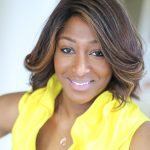
Guest Musicians, Rev. John Wilkins and Dom Turner
Hosted by Jim Dees and TMR house band, The Yalobushwhackers
 Born in Atlanta, Georgia, but raised in both Georgia and Mississippi, Hilary Word now proudly claims Jackson, Mississippi, as her home. She completed her undergraduate education at Tougaloo College, where she obtained a BA in history in May 2017. She entered the Southern Studies MA program in the fall of 2018 and graduated in May 2020. Word’s thesis, “Post-Soul Speculation: An Exploration of Afro-Southern Speculative Fiction,” earned her the Sue Hart Prize for outstanding paper at the intersection of Southern Studies and gender studies.
Born in Atlanta, Georgia, but raised in both Georgia and Mississippi, Hilary Word now proudly claims Jackson, Mississippi, as her home. She completed her undergraduate education at Tougaloo College, where she obtained a BA in history in May 2017. She entered the Southern Studies MA program in the fall of 2018 and graduated in May 2020. Word’s thesis, “Post-Soul Speculation: An Exploration of Afro-Southern Speculative Fiction,” earned her the Sue Hart Prize for outstanding paper at the intersection of Southern Studies and gender studies.LISTEN TO A SAMPLE FROM WE CAST A SHADOW
 In her prerecorded SouthTalk below, Simone Delerme discusses the findings from her new book, Latino Orlando: Suburban Transformation and Racial Conflict, which documents the ways that southern places are being transformed by an influx of Latino migrants. She will be drawing comparisons to her current research in Memphis, which examines how newcomers challenge the South’s historic black-white racial binary and are incorporated into the social, political, and economic life of communities that were nontraditional destinations of migration.
In her prerecorded SouthTalk below, Simone Delerme discusses the findings from her new book, Latino Orlando: Suburban Transformation and Racial Conflict, which documents the ways that southern places are being transformed by an influx of Latino migrants. She will be drawing comparisons to her current research in Memphis, which examines how newcomers challenge the South’s historic black-white racial binary and are incorporated into the social, political, and economic life of communities that were nontraditional destinations of migration.
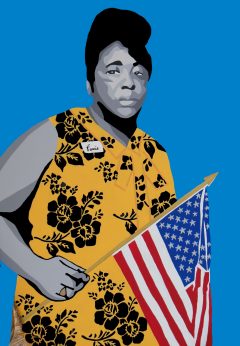
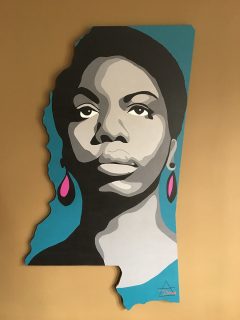
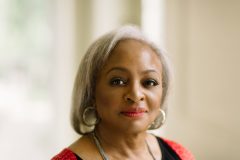
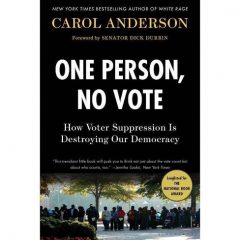 Her most recent book, One Person, No Vote: How Voter Suppression is Destroying our Democracy, was Long-listed for the National Book Award in Non-Fiction and was a finalist for the PEN/Galbraith Book Award in Non-Fiction.
Her most recent book, One Person, No Vote: How Voter Suppression is Destroying our Democracy, was Long-listed for the National Book Award in Non-Fiction and was a finalist for the PEN/Galbraith Book Award in Non-Fiction.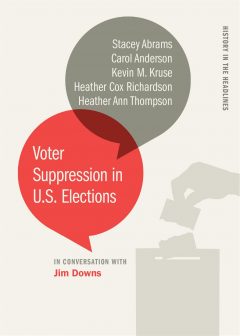 Historians have long been engaged in telling the story of the struggle for the vote. In the wake of recent contested elections, the suppression of the vote has returned to the headlines, as awareness of the deep structural barriers to the ballot, particularly for poor, black, and Latino voters, has called attention to the historical roots of issues related to voting access. Perhaps most notably, former state legislator Stacey Abrams’s campaign for Georgia’s gubernatorial race drew national attention after she narrowly lost to then-secretary of state Brian Kemp, who had removed hundreds of thousands of voters from the official rolls. After her loss, Abrams created Fair Fight, a multimillion-dollar initiative to combat voter suppression in twenty states. At an annual conference of the Organization of American Historians, Carol Anderson, Kevin M. Kruse, Heather Cox Richardson, and Heather Anne Thompson had a conversation with Stacey Abrams about the long history of voter suppression at the Library Company of Philadelphia. Voter Suppression in U.S. Elections is a transcript of that extraordinary conversation, edited by Jim Downs.
Historians have long been engaged in telling the story of the struggle for the vote. In the wake of recent contested elections, the suppression of the vote has returned to the headlines, as awareness of the deep structural barriers to the ballot, particularly for poor, black, and Latino voters, has called attention to the historical roots of issues related to voting access. Perhaps most notably, former state legislator Stacey Abrams’s campaign for Georgia’s gubernatorial race drew national attention after she narrowly lost to then-secretary of state Brian Kemp, who had removed hundreds of thousands of voters from the official rolls. After her loss, Abrams created Fair Fight, a multimillion-dollar initiative to combat voter suppression in twenty states. At an annual conference of the Organization of American Historians, Carol Anderson, Kevin M. Kruse, Heather Cox Richardson, and Heather Anne Thompson had a conversation with Stacey Abrams about the long history of voter suppression at the Library Company of Philadelphia. Voter Suppression in U.S. Elections is a transcript of that extraordinary conversation, edited by Jim Downs.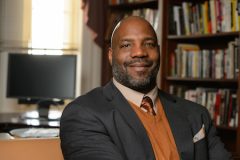
Gussow’s book Whose Blues? Facing Up to Race and the Future of the Music challenges us to think freshly about the blues in a postmodern moment, more than a century removed from the music’s rural southern origins. If “blues is Black music,” as some contemporary claimants insist, what should we make of the International Blues Challenge held annually in Memphis, with its all-comers mix of nationalities and ethnicities? If there’s “no Black, no white, just the blues,” as another familiar meme would have us believe, why do some Black blues people hear that proclamation not as a call to transracial fellowship, but as an aggressive attempt at cultural appropriation and the erasure of traumatic racial histories sounded by the music?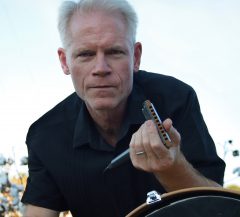
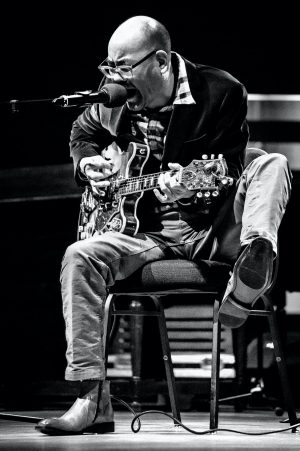
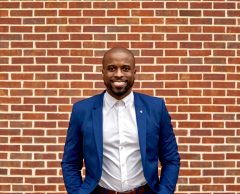
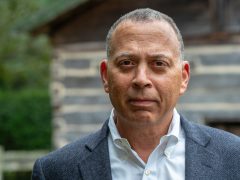 The southern landscape is varied and contains some places that seem frozen in time and others where time melts along the edges. It is an inspiration to photographers and writers, fueling how one sees the world through a camera and establishing settings for stories. David Wharton and W. Ralph Eubanks discuss their experiences with the southern landscape, Wharton as a photographer and Eubanks as a writer and student of southern literature. Wharton discusses his book Scenes from Southern Roadsides, which contains 133 black-and-white photographs made in rural areas throughout the American South. Eubanks talks about his forthcoming book, A Place Like Mississippi, which examines how Mississippi’s landscape has influenced the work of its writers. Together they discuss how photographers present the realities of the landscape and how writers overlay their impressions over those realities.
The southern landscape is varied and contains some places that seem frozen in time and others where time melts along the edges. It is an inspiration to photographers and writers, fueling how one sees the world through a camera and establishing settings for stories. David Wharton and W. Ralph Eubanks discuss their experiences with the southern landscape, Wharton as a photographer and Eubanks as a writer and student of southern literature. Wharton discusses his book Scenes from Southern Roadsides, which contains 133 black-and-white photographs made in rural areas throughout the American South. Eubanks talks about his forthcoming book, A Place Like Mississippi, which examines how Mississippi’s landscape has influenced the work of its writers. Together they discuss how photographers present the realities of the landscape and how writers overlay their impressions over those realities.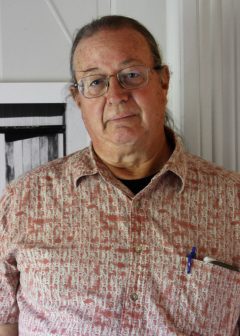
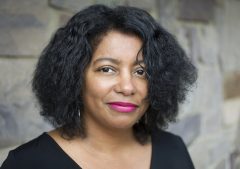
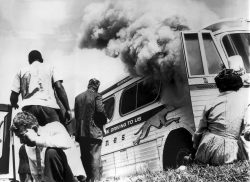
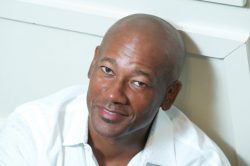
Daphne Chamberlain’s talk highlights the role of children as leaders and participants in the Mississippi civil rights movement between 1946 and 1965. This presentation also offers a new perspective on the origins of the civil rights struggle and gives credence to how instrumental young people were to engaging in radical protest and grassroots activism in Mississippi.
